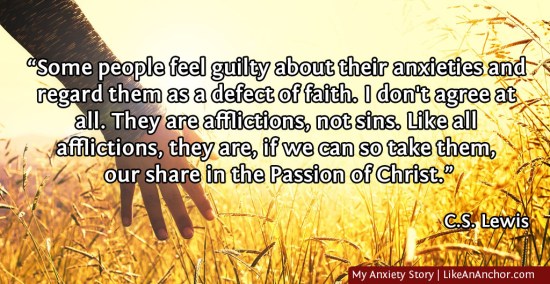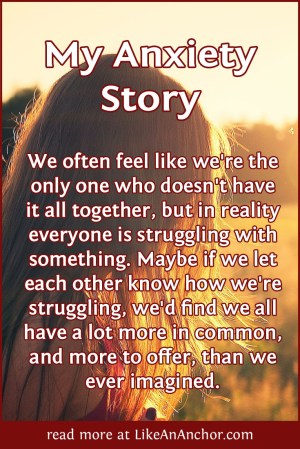My first panic attack happened in a Blockbuster about 14 or 15 years ago. I was high-school age and trying to spend a gift card I’d won in a library reading program. I hadn’t been in there before and new places made me nervous, but I’d planned exactly what I was looking for and my mom and sister were with me so it was going to be fine. Then the DVD wasn’t there. And I can’t make up my mind what to do, my mom wants me to hurry up because we’re running late, my sister says just make a decision already, and suddenly I can’t breath so I grab a DVD march up to the counter, and get out. Then my family asks why I was rude to the cashier and seem so angry.
It didn’t feel like anger. My heart was racing, hands shaking, breathing shallow. I felt hot all over and my skin seemed too small. But other than embarrassing, I didn’t know what it was. And then it happened again months later in a Hobby Lobby. I’d worked up the courage to ask about a price that seemed too high, which lead to a confrontation with the manager and the realization that I was the one who’d read the sign wrong. Again the tightness in my chest, the shallow breathing, the shaking, and too-warm feeling. I couldn’t get out of there fast enough.
College didn’t make things any better. After I spent most of my first quarter hiding or in tears, I found myself in the Dewey Decimal 155.2 (Individual Psychology) section of a library’s bookshelves. Susan Cain’s Quiet: The Power of Introverts In A World That Won’t Stop Talking* and Elaine Aron’s The Highly Sensitive Person: How to Thrive When the World Overwhelms You
* were literal life-changers. I recommend them to people more often than any other non-fiction book except the Bible. I finally understood why so many things that other people treated as normal seemed overwhelming to me. But they still didn’t explain everything.
- *please note that these are affiliate links, which means that at no additional cost to you, I’ll receive a small commission if you click on the link and make a purchase.
Realizing I Had Anxiety
I’m not sure exactly when I began to suspect I was dealing with an anxiety disorder. In June of 2013 I wrote on this blog, “I’m not very good at letting go of my anxiety.” But I was still thinking of it more in the sense of “I worry too much” rather than “a psychologist would say I have anxiety.” I started feeling guilty for thinking of myself as anxious, especially when people who knew they had anxiety started following my blog and I realized mine didn’t seem as bad as theirs. Maybe I was just a wimp who was overeating to normal, everyday worries.
Then in April of 2016 I had another panic attack. By that time, I thought of myself as having social anxiety and assumed I had a pretty good idea of how to deal with it. This was the worst panic attack I’d had in several years and there was no good reason for it. Sure I was going to a social event, but it was a safe group of people in my church and I had several friends who would be there. So why was I shaking, crying, and hyperventilating in my car? And even though I got it under control enough to drive, the feeling of near-panic stayed for the entire weekend.
But along with that barely-hidden panic came a strange sense of peace. In a blog post after the event, I wrote, “The fact that I had a panic attack before leaving turned into a blessing because it gave me the choice between either canceling my plans or praying through it and trusting God. I chose the later, and I kept encountering situations that could make me feel nervous and which reminded me to stay in prayer all weekend. Every single one of the things I was worried about worked out for the best, and the only part of that I can take credit for is that I took the step to go to the weekend and start a few conversations. The rest was all God.” And so I arrived at the conclusion that yes, I did have anxiety, but I could handle it without outside help from anyone but God. I’d be fine.

Getting Some Help
Fast-forward two years. My first romantic relationship (even at the beginning when things were good) made me realize that I hadn’t really been “handling it” in regard to my anxiety. I was just avoiding anything I knew might trigger it. Now that the relationship was falling apart after only 9 months, I’d crawl out of bed hours after my alarm went off. I barely hit my writing deadlines for work. The smallest decision felt overwhelming. I couldn’t pull a coherent thought out of the swirling cloud of “what if?” questions. My shoulders and neck were so tense that both moving and sitting hurt. My stomach tied itself in knots until I didn’t want to eat. That’s when my now ex-boyfriend, my sister, and my brother convinced me to finally see someone about my anxiety.
I think God led me to my first counselor. Everything fell into place too perfectly for it to not be Him. The office had just started taking my insurance. I clicked with her at our first meeting. And a scheduling change worked out so our third session was the day after my boyfriend and I broke-up. I felt so safe talking with her and I loved having a Christian counselor who quoted scripture while guiding me through Cognitive Behavioral Therapy. I counseled with her for about a year.
According to the Anxiety and Depression Association of America, “Generalized Anxiety Disorder (GAD) is characterized by persistent and excessive worry about a number of different things” and it affects 3.1% of the population. It happens when you have long-term difficulty controlling worry that’s not related to a specific stressor or event. Often, people with GAD know their anxious reaction is more intense than needed in a given the situation, but it still feels like you have no control over it. GAD rarely occurs alone (lucky us), so if you’ve got generalized anxiety there’s a good chance you’re also dealing with social anxiety, depression, eating disorders, and/or some other condition.
Opening Up About It
Since the start of counseling and then my breakup, I’ve become much more open about my struggles with anxiety. At first, this was because I didn’t have the emotional energy to pretend everything was all right. I’ve also discovered that naming and acknowledging the anxiety takes away some of its power. For example, one of my big worries is that I’ll have a panic attack in front of someone and it’ll freak them out and they’ll judge me for it. But for some reason, letting people know that panic attacks happen for me pops that particular anxiety bubble.
Some people would say you shouldn’t claim the anxiety disorder (or whatever it is you battle) as yours. They’ll say that admitting it’s a part of you is a form of giving in. Instead, they want you to tell God you’re not accepting this diagnosis and you have faith He’ll take it away. It didn’t work like that for me. Pretending I didn’t have anxiety only made me plan my life around avoiding anxiety triggers so I didn’t have to deal with the fact that everything wasn’t okay. I don’t think God wants us to live in a state of denial. I think He wants us to face the battles inside our minds and trust Him to help us fight them.
“For though we walk in the flesh, we don’t wage war according to the flesh; for the weapons of our warfare are not of the flesh, but mighty before God to the throwing down of strongholds, throwing down imaginations and every high thing that is exalted against the knowledge of God, and bringing every thought into captivity to the obedience of Christ” (2 Corinthians 10:3-5, WEB)
Everyone’s Fighting Something

Paul makes it sound like battles that other people can’t see are an every-day sort of challenge for Christians. He doesn’t make it seem odd, or shameful, or wrong to be fighting something inside your own head. And we can take comfort in that because it means God has plenty of practice helping His people through this kind of battle. In fact, I’d venture a guess that most Christians — most human beings, really — struggle with something that isn’t visible to other people. But we don’t say anything. There’s too much of a stigma in the churches against admitting you’re not okay right now. And that’s sad, because fellow believers should be the safest people to share our struggles with.
“Some people feel guilty about their anxieties and regard them as a defect of faith. I don’t agree at all. They are afflictions, not sins. Like all afflictions, they are, if we can so take them, our share in the Passion of Christ” – C.S. Lewis, Letters to Malcolm: Chiefly on Prayer
One of my main goals in being more open about my own anxiety is to help other people feel safe sharing their struggles. For so long, I felt trapped in the “it’s just me” bubble, certain that if I let people know what I was going through they wouldn’t like how strange and weird I was. Then I started talking with people more and really listening. And I found out there are a lot of people out there who think “I’m the only one” and “I can’t let people know how messed-up I am.” But maybe if we let each other know how we’re struggling, we’d all find we have a lot more in common than we ever imagined.

I’m an avoidant. My lack of self-esteem fueled my self-isolation and social phobia. True to it’s name, my coping mechanism was to avoid that which was frightening. Christianity was like the screw in my side that could be twisted to make things worse. The more I prayed for God to fix my thorn, the deeper it sank in. I wasn’t praying hard enough, I wasn’t worthy enough, etc. After I took a break from church, I started to breathe again. Funny. I’m glad God helped your anxiety. I don’t know what I must have done wrong for him to fuel mine.
LikeLike
Evalyn, sometimes when the Lord is training you and when it seems impossible, the enemy will tell you that if you go back to him, he will relieve the problem.
I probably have GAD and one year I had just learned the art of spiritual listening, which healed my anxiety while I was doing it, but then I made friends with this girl who shared my favorite hobby (inventing characters and stories… actually she just made characters but mine had stories). She had borderline personality disorder and wasn’t a Christian. By my precious stories, which I believed were gofts from God, she led me down a dark path and away from Him.
Between two Easters I had no desire to attend churh and spent all my time role playing (essentially co-writing stories) with my friend. Without giving God a place at my side, an addiction took over and consumed my life until I was incapable of caring about anything at all, and not even role play could satisfy me. I also was extra sensitive to the world around me and I couldn’t tell right from wrong anymore. My intuition had also died, and my stories lost their spark without their original source.
I returned to church the following Easter while my friend was gone for a while and found that I wanted to come back regularly even though it was only a spark of life. After my friend returned to town I spiraled very quickly and had to take medication for a time, because I could not think or sleep without dwelling on role play and stories, which had once been my therapy and safe haven from anxiety, were suddenly a trigger for it, and I didn’t know how to not think about them anymore. I also had to keep busy and social non-stop to get out of my own head despite my preferred hermitage.
I left the friendship, but for months I didn’t feel right unless I was literally sitting down and reading the Bible. I got through a good chunk of it too. I read maybe 7 chapters a sitting and got lost somewhere in Kings.
Four years later, I am now fully healed and restored from that event (again, around Easter last year), but I now know the allure of the enemy and the lies that he tells. It is a lie that things will be better if you give in. It may be nice for a while but eventually you will discover that you are surrounded by wolves, and now you have no one to protect you, let alone encourage you to fight. You will have to ask him to come back, and you will have to fight, and it will be harder than any struggle you suffered before. I hope you can avoid the mistake I made. My heart was pure fear the day I spiraled, and the only hand that can pull you out of that is the hand of God, but that doesn’t mean it is a quick fix. Something is terribly wrong in your heart at that point and it needs deep healing. He has a journey prepared for you to find that healing. I hope you choose to accept His guidance.
Pray for faith, for wisdom, for the desire for Him again, for Him to never ever let you go, for Him to not let you walk away, for true brothers and sisters in Christ to guide you, and perhaps most important, listen for Him to tell you how much He loves you daily.
LikeLiked by 1 person
Evalyn, I’m so sorry that your experiences with Christianity seem to have made things worse and not better. That’s not how it’s supposed to be. If someone told you that the reason you’re struggling is because you’re not worthy enough or you aren’t praying hard enough, then they were wrong. Bad things happen because we live in a fallen world, not because God wants to see us suffer (and I firmly believe that includes mental health struggles). He wants to give us an abundant, redeemed life and He promises to fight along side us for that life when it seems out of reach.
One thing I’ve found is that God helps me through my struggles far more often than He takes them away. Though people have told me I should ask God to cure my anxiety and depression completely, I don’t expect Him to completely re-wire how my brain works. Instead, I ask Him for help getting through. And even though I do feel He answers, those answers usually come through an encouraging song popping into my head or a friend’s text message rather than Him stepping in and fixing the problem directly or making my worries evaporate.
Coming to Christ doesn’t mean He magically cures us of all our problems. It means He’s there with us through those problems and that He works to heal our broken hearts, comfort us, and guide us toward a far better outcome than we could expect apart from him. It’s an ongoing process, one that doesn’t always (or even usually) go smoothly, but which He promises to help you through. I really appreciate Meredith sharing how that has happened in her life. And I hope you’ll consider giving God another chance to help you and to show that His love is real and faithful.
LikeLike